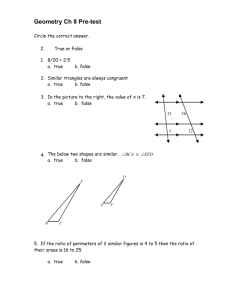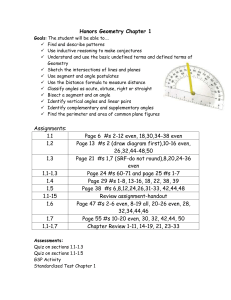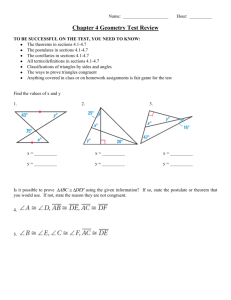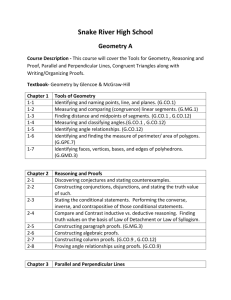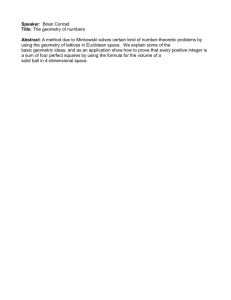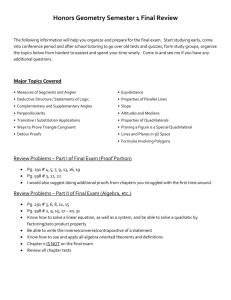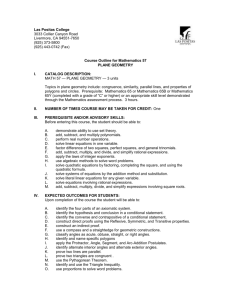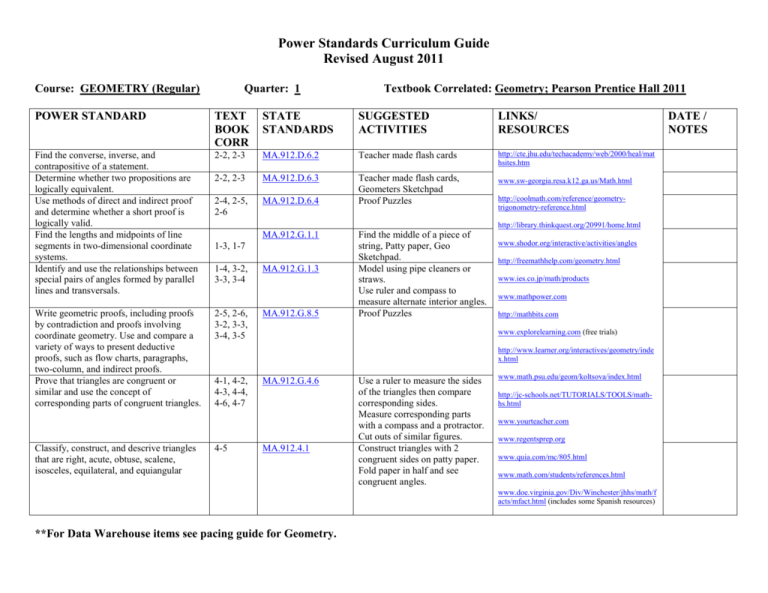
Power Standards Curriculum Guide
Revised August 2011
Course: GEOMETRY (Regular)
Quarter: 1
Textbook Correlated: Geometry; Pearson Prentice Hall 2011
POWER STANDARD
TEXT
BOOK
CORR
STATE
STANDARDS
SUGGESTED
ACTIVITIES
LINKS/
RESOURCES
Find the converse, inverse, and
contrapositive of a statement.
Determine whether two propositions are
logically equivalent.
Use methods of direct and indirect proof
and determine whether a short proof is
logically valid.
Find the lengths and midpoints of line
segments in two-dimensional coordinate
systems.
Identify and use the relationships between
special pairs of angles formed by parallel
lines and transversals.
2-2, 2-3
MA.912.D.6.2
Teacher made flash cards
http://cte.jhu.edu/techacademy/web/2000/heal/mat
hsites.htm
2-2, 2-3
MA.912.D.6.3
www.sw-georgia.resa.k12.ga.us/Math.html
2-4, 2-5,
2-6
MA.912.D.6.4
Teacher made flash cards,
Geometers Sketchpad
Proof Puzzles
Write geometric proofs, including proofs
by contradiction and proofs involving
coordinate geometry. Use and compare a
variety of ways to present deductive
proofs, such as flow charts, paragraphs,
two-column, and indirect proofs.
Prove that triangles are congruent or
similar and use the concept of
corresponding parts of congruent triangles.
2-5, 2-6,
3-2, 3-3,
3-4, 3-5
Classify, construct, and descrive triangles
that are right, acute, obtuse, scalene,
isosceles, equilateral, and equiangular
http://coolmath.com/reference/geometrytrigonometry-reference.html
http://library.thinkquest.org/20991/home.html
MA.912.G.1.1
1-3, 1-7
1-4, 3-2,
3-3, 3-4
MA.912.G.1.3
MA.912.G.8.5
Find the middle of a piece of
string, Patty paper, Geo
Sketchpad.
Model using pipe cleaners or
straws.
Use ruler and compass to
measure alternate interior angles.
Proof Puzzles
www.shodor.org/interactive/activities/angles
http://freemathhelp.com/geometry.html
www.ies.co.jp/math/products
www.mathpower.com
http://mathbits.com
www.explorelearning.com (free trials)
http://www.learner.org/interactives/geometry/inde
x.html
4-1, 4-2,
4-3, 4-4,
4-6, 4-7
4-5
MA.912.G.4.6
MA.912.4.1
Use a ruler to measure the sides
of the triangles then compare
corresponding sides.
Measure corresponding parts
with a compass and a protractor.
Cut outs of similar figures.
Construct triangles with 2
congruent sides on patty paper.
Fold paper in half and see
congruent angles.
www.math.psu.edu/geom/koltsova/index.html
http://jc-schools.net/TUTORIALS/TOOLS/mathhs.html
www.yourteacher.com
www.regentsprep.org
www.quia.com/mc/805.html
www.math.com/students/references.html
www.doe.virginia.gov/Div/Winchester/jhhs/math/f
acts/mfact.html (includes some Spanish resources)
**For Data Warehouse items see pacing guide for Geometry.
DATE /
NOTES
Course: GEOMETRY (Regular)
Quarter: 2
Textbook Correlated: Geometry; Pearson Prentice Hall 2011
POWER STANDARD
TEXT
BOOK
CORR
STATE
STANDARDS
SUGGESTED
ACTIVITIES
LINKS/
RESOURCES
Prove theorems involving quadrilaterals
6-2, 6-3,
6-4, 6-5,
6-6
5-2, 5-3,
5-4
MA.912. 3.4
Word puzzles and quadrilateral
flow chart or Venn diagram.
http://cte.jhu.edu/techacademy/web/2000/heal/mat
hsites.htm
MA.912.G.4.2
Use ruler to measure actual size
of similar objects.
5-1, 5-4,
6-2
5-6, 5-7
MA.912.G.4.5
5-5, 6-2,
6-3
MA.912.8.5
Define, identify, and construct altitudes,
medians, angle bisectors, perpendicular
bisectors, orthoscenter, centroid, incenter,
and circumcenter.
Apply theorems involving segments
divided proportionally.
Apply the inequality theorems: triangle
inequality, inequality in one triangle, and
the Hinge theorem.
Write geometric proofs, including proofs
by contradiction and proofs involving
coordinate geometry. Use and compare a
variety of ways to present deductive
proofs, such as flow charts, paragraphs,
two-column, and indirect proofs.
Describe, classify, and compare
relationships among quadrilaterals
including the square, rectangle, rhombus,
parallelogram, trapezoid, and kite.
Compare and contrast special
quadrilaterals on the basis of their
properties.
www.sw-georgia.resa.k12.ga.us/Math.html
http://coolmath.com/reference/geometrytrigonometry-reference.html
http://library.thinkquest.org/20991/home.html
Cut outs of similar figures.
www.shodor.org/interactive/activities/angles
MA.912.4.7
Use paper strips with fasteners to
show effect of changing angle
size.
Proof puzzles.
http://freemathhelp.com/geometry.html
www.ies.co.jp/math/products
www.mathpower.com
http://mathbits.com
www.explorelearning.com (free trials)
6-4, 6-5,
6-6, 6-7
MA.912.G.3.1
6-4, 6-5,
6-6
MA.912.G.3.2
Word puzzles and quadrilateral
flow chart or Venn diagram.
Use rulers and protractors to
measure sides and angles.
http://www.learner.org/interactives/geometry/inde
x.html
www.math.psu.edu/geom/koltsova/index.html
http://jc-schools.net/TUTORIALS/TOOLS/mathhs.html
www.yourteacher.com
www.regentsprep.org
www.quia.com/mc/805.html
www.math.com/students/references.html
www.doe.virginia.gov/Div/Winchester/jhhs/math/f
acts/mfact.html (includes some Spanish resources)
Use coordinate geometry to prove
properties of congruent, regular, and
similar quadrilaterals.
6-7, 6-8,
6-9
MA.912.G.3.3
**For Data Warehouse items see pacing guide for Geometry.
Use graph paper and rulers and
protractors to measure sides and
angles.
DATE /
NOTES
Course: GEOMETRY (Regular)
Quarter: 3
Textbook Correlated: Geometry; Pearson Prentice Hall 2011
POWER STANDARD
TEXT
BOOK
CORR
STATE
STANDARDS
SUGGESTED
ACTIVITIES
LINKS/
RESOURCES
Define and use the trigonometric ratios (sine,
cosine, tangent, cotangent, secant, cosecant) in
terms of angles of right triangles.
Use properties of congruent and similar
polygons to solve mathematical or real-world
problems.
Apply transformations (translations, reflections,
rotations, dilations, and scale factors) to
polygons to determine congruence, similarity,
and symmetry. Know that images formed by
translations, reflections, and rotations are
congruent to the original shape. Create and
verify tessellations of the plane using polygons.
Apply theorems involving segments divided
proportionally.
Prove and apply the Pythagorean Theorem and
its converse.
Use special right triangles (30-60-90 and 45-4590) to solve problems.
8-3, 8-4
MA.912.T.2.1
Word puzzles.
http://cte.jhu.edu/techacademy/web/2000/heal/mat
hsites.htm
7-2, 7-3
MA.912.G.2.3
Use mirrors to find heights.
Solve real-world problems involving right
triangles.
Explain the derivation and apply formulas for
perimeter and area of polygons (triangles,
quadrilaterals, pentagons, etc.).
7-3, 8-1,
8-2
10-1, 102, 10-3,
10-4, 105, 10-8
MA.912.G.2.5
Determine how changes in dimensions affect
the perimeter and area of common geometric
figures.
10-1, 103, 10-4,
10-7
10-6
MA.912.G.2.7
Define and identify: circumference, radius,
diameter, arc, arc length, chord, secant, tangent
and concentric circles .
Determine and use measures of arcs and related
angles (central, inscribed, and intersections of
secants and tangents).
Solve real-world problem s using measures of
circumference, arc length, and areas of circles
and sectors.
www.sw-georgia.resa.k12.ga.us/Math.html
http://coolmath.com/reference/geometrytrigonometry-reference.html
9-1, 9-2,
9-3, 9-4,
9-5, 9-6,
9-7
MA.912.G.2.4
Use Patty Paper, paper folding,
and Miras. Use physical and
visual models to demonstrate the
transformation.
http://library.thinkquest.org/20991/home.html
www.shodor.org/interactive/activities/angles
http://freemathhelp.com/geometry.html
www.ies.co.jp/math/products
7-5
MA.912.G.4.5
8-1
MA.912.G.5.1
Use rulers and protractors to
measure sides and angles.
Use rulers and protractors to
measure sides and angles.
8-2
10-6, 107, 12-3,
12-4
10-6, 107, 10-8
www.mathpower.com
http://mathbits.com
www.explorelearning.com (free trials)
MA.912.G.5.3
MA.912.G.5.4
Use mirrors to find heights.
http://www.learner.org/interactives/geometry/inde
x.html
Use strings, rulers, and physical
models.
www.math.psu.edu/geom/koltsova/index.html
Use rulers and physical models.
www.yourteacher.com
http://jc-schools.net/TUTORIALS/TOOLS/mathhs.html
www.regentsprep.org
MA.912.G.6.2
MA.912.G.6.4
MA.912.G.6.5
Have students construct a circle
and parts using patty paper and
compass, then folding the paper.
Use hoops, string, and
measurement tools.
Different size plates.
Physical objects such as soda
cans, ice cream cones, globes,
boxes and balls.
www.quia.com/mc/805.html
www.math.com/students/references.html
www.doe.virginia.gov/Div/Winchester/jhhs/math/f
acts/mfact.html (includes some Spanish resources)
DATE /
NOTES
Course: GEOMETRY (Regular)
Quarter: 4
Textbook Correlated: Geometry; Pearson Prentice Hall 2011
POWER STANDARD
TEXT
BOOK
CORR
STATE
STANDARDS
SUGGESTED
ACTIVITIES
LINKS/
RESOURCES
Given the center and the radius, find the
equation of a circle in the coordinate plane or
given the equation of a circle in center-radius
form, state the center and the radius of the
circle. Given the equation of a circle in centerradius form or given the center and the radius of
a circle, sketch the graph of the circle.
12-5
MA.912.G.6.6
MA.912.G.6.7
Puzzle worksheets.
http://cte.jhu.edu/techacademy/web/2000/heal/mat
hsites.htm
Explain and use formulas for lateral area,
surface area, and volume of solids.
11-2,113, 11-4,
11-5, 116
Determine how changes in dimensions
affect the surface area and volume of
common geometric solids.
www.sw-georgia.resa.k12.ga.us/Math.html
http://coolmath.com/reference/geometrytrigonometry-reference.html
11-2,113, 11-4,
11-5, 116
MA.912.G.7.5
MA.912.G.7.7
**For Data Warehouse items see pacing guide for Geometry.
Draw nets on grid paper, cut out,
and tape together. Count surface
area. Physical objects such as
soda cans, ice cream cones,
globes, boxes and balls.
Draw nets on grid paper, cut out,
and tape together. Compare
surface areas.
http://library.thinkquest.org/20991/home.html
www.shodor.org/interactive/activities/angles
http://freemathhelp.com/geometry.html
www.ies.co.jp/math/products
www.mathpower.com
http://mathbits.com
www.explorelearning.com (free trials)
http://www.learner.org/interactives/geometry/inde
x.html
www.math.psu.edu/geom/koltsova/index.html
http://jc-schools.net/TUTORIALS/TOOLS/mathhs.html
www.yourteacher.com
www.regentsprep.org
www.quia.com/mc/805.html
www.math.com/students/references.html
www.doe.virginia.gov/Div/Winchester/jhhs/math/f
acts/mfact.html (includes some Spanish resources)
DATE /
NOTES

